
Less butter, more plant oils, longer life?

Healthier planet, healthier people

Counting steps is good 鈥� is combining steps and heart rate better?

Appendix pain: Could it be appendicitis?

Can saw palmetto treat an enlarged prostate?

How does Ozempic work? Understanding GLP-1s for diabetes, weight loss, and beyond

Zinc: What it does for the body, and the best food sources

Respiratory health harms often follow flooding: Taking these steps can help

Tips to leverage neuroplasticity to maintain cognitive fitness as you age

Can white noise really help you sleep better?
Sleep Archive
Articles
Sleeping too much or not enough may raise the risk of cognitive decline
Research we're watching
People who sleep too much or too little may be at higher risk for cognitive decline, according to a study published Sept. 21, 2020, by JAMA Network Open. Researchers looked at self-reported sleep duration from 20,065 people in two large studies, one in the United Kingdom and one in China. The participants from the United Kingdom were ages 50 and older and those living in China were 45 and older and were followed by researchers for up to 15 years. Researchers asked participants questions about their sleep patterns and performed a cognitive assessment. The process was repeated at two year intervals during the various study periods. Researchers found that people who slept too little (four or fewer hours a night) or too much (10 or more hours a night) were more likely than more typical sleepers to experience cognitive decline.
Image: SelectStock/Getty Images
Music to your health
The soothing and motivational sounds of music have far-reaching health benefits.
A favorite musical tune can stir up positive memories, boost your mood, and create a soothing, relaxing setting. But used in specific ways, music also is a valuable tool for supporting your health.
"Whether you need to relax, increase your energy, improve your thinking, or just get motivated for the day, music can provide extra support when you need it the most," says Marisabelle Diaz-Falcon, a music therapist with Harvard-affiliated Massachusetts General Hospital.
Will these surprising factors really raise your blood sugar?
Learn what will and won't increase blood sugar levels and put your health in jeopardy.
It's essential to keep your blood sugar from spiking (rising suddenly), whether you're healthy or you're among the 122 million Americans who have diabetes or prediabetes. But with all the conflicting advice in circulation, it can be hard to figure out what foods and habits you need to avoid.
Bogus claims
On the Internet you'll find many reports of factors that purportedly increase blood sugar. Here are a few claims that you should know about because they just don't hold up.
How does sleep affect your heart rate?
During waking hours you may feel your heart rate fluctuating, and activity or intense emotions can cause it to spike. But what happens to your heart rate when you sleep? It varies then too, depending on the phase of sleep you are in.
Tips to keep lost weight off in the New Year
Work with your body, not against it, for long-term weight maintenance.
For many people, their New Year's resolutions include some sort of weight-loss goal. However, while extra pounds often come off, evidence shows they rarely stay off. Among overweight or obese people who are able to lose 10% of their body weight, just one in six is able to maintain the weight loss for at least a year.
Experts say it's not surprising that weight loss rarely sticks, considering what they now know about how the body works. "Most people believe that obesity is caused by overeating, while we now recognize that the main driver of obesity is one or more disruptions in the body's normal regulation of the amount of fat we maintain," says Dr. Lee Kaplan, an associate professor of medicine at Harvard Medical School and director of the Obesity, Metabolism, and Nutrition Institute at Massachusetts General Hospital.
The beat goes on
Learn when, how, and why you should keep track of your heartbeat.
Soon after you wake up tomorrow morning, before you even sit up in bed, take your pulse. It's fairly easy if you have a clock or timer nearby (see "Measuring your heart rate"). Known as your resting heart rate, this value ranges from 60 to 100 beats per minute in most adults.
"To get a good sense of your resting heart rate, check it every few mornings over the course of several weeks," advises cardiologist Dr. Aaron Baggish, director of the Cardiovascular Performance Program at Harvard-affiliated Massachusetts General Hospital. It's best to measure your resting heart rate when you've been getting your typical amount of sleep and exercise and aren't feeling ill or dehydrated.
Reset your schedule, reset your health
Schedule shifts can hurt your health. The New Year is a great time to hit the reset button.
Throughout most of human history, the pattern of daily life was regular. Dreary for many, but regular. In recent centuries, "modern" life has introduced many irregularities, including changing work schedules. Advances in information technology mean that many of us are always connected 鈥� and that we spend time connecting at all hours. And the COVID-19 pandemic has introduced whole new irregularities into daily life.
One thing is certain: "When your schedule changes, you can lose the regular self-care routines that kept you active, eating right, and managing stress 鈥� things we need to control weight and inflammation and fight disease," says Dr. Monique Tello, a primary care physician and healthy lifestyle specialist with Harvard-affiliated Massachusetts General Hospital.
What are the long-lasting effects of COVID-19?
Ask the doctor
Q. I read that the death rate from COVID-19 is going down, but that people who recover from the infection still can remain sick for a long time. Is that true?
A. It is true, but we don't yet know how big the problem is: COVID-19 has been with us for only a year, and there hasn't been enough time to know the long-term effects.
Early birds may be more active, but night owls can catch up
Researchers measuring activity levels found that people who tend to go to bed later and sleep later also tend to get less physical activity, compared to early risers. However, these results don't mean that being a night owl is the cause of getting less activity, or that such behavior can't be changed.
How do I improve the quality of my sleep?
Ask the doctor
Q. How many hours of sleep do I need each night, and how do I improve the quality of my sleep?
A. Adults need to average between seven and nine hours of sleep per night. If you're over 65, eight hours might be enough. The occasional short night of sleep won't hurt you.

Less butter, more plant oils, longer life?

Healthier planet, healthier people

Counting steps is good 鈥� is combining steps and heart rate better?

Appendix pain: Could it be appendicitis?

Can saw palmetto treat an enlarged prostate?

How does Ozempic work? Understanding GLP-1s for diabetes, weight loss, and beyond

Zinc: What it does for the body, and the best food sources

Respiratory health harms often follow flooding: Taking these steps can help

Tips to leverage neuroplasticity to maintain cognitive fitness as you age

Can white noise really help you sleep better?
Free Healthbeat Signup
Get the latest in health news delivered to your inbox!
Sign Up











